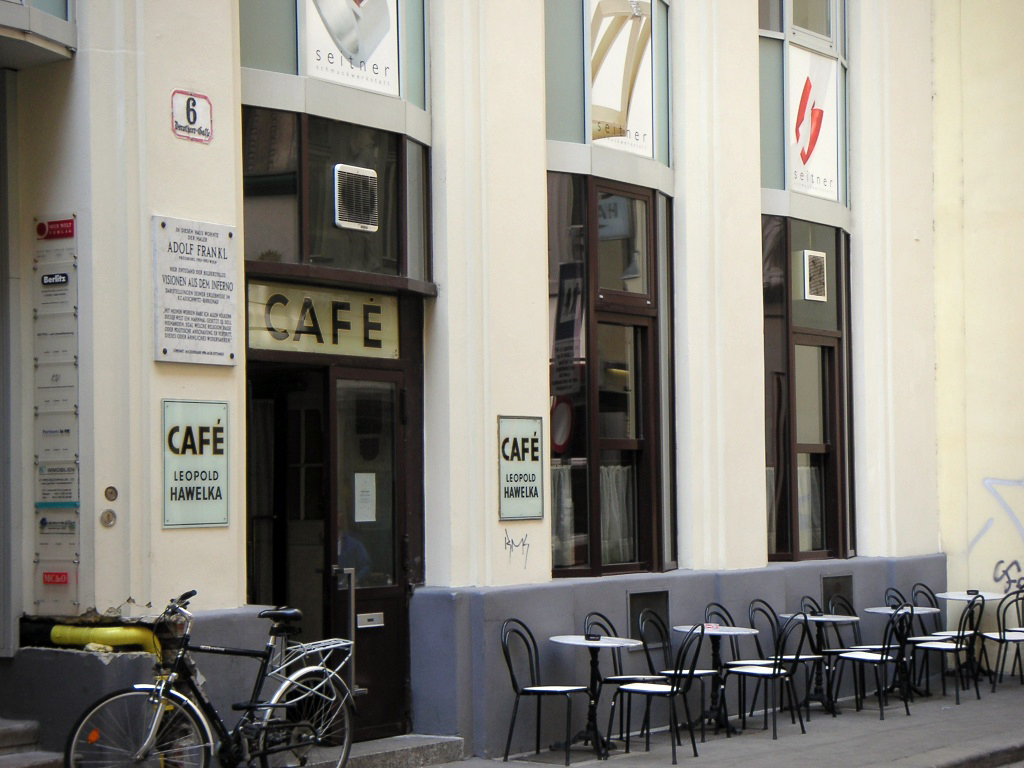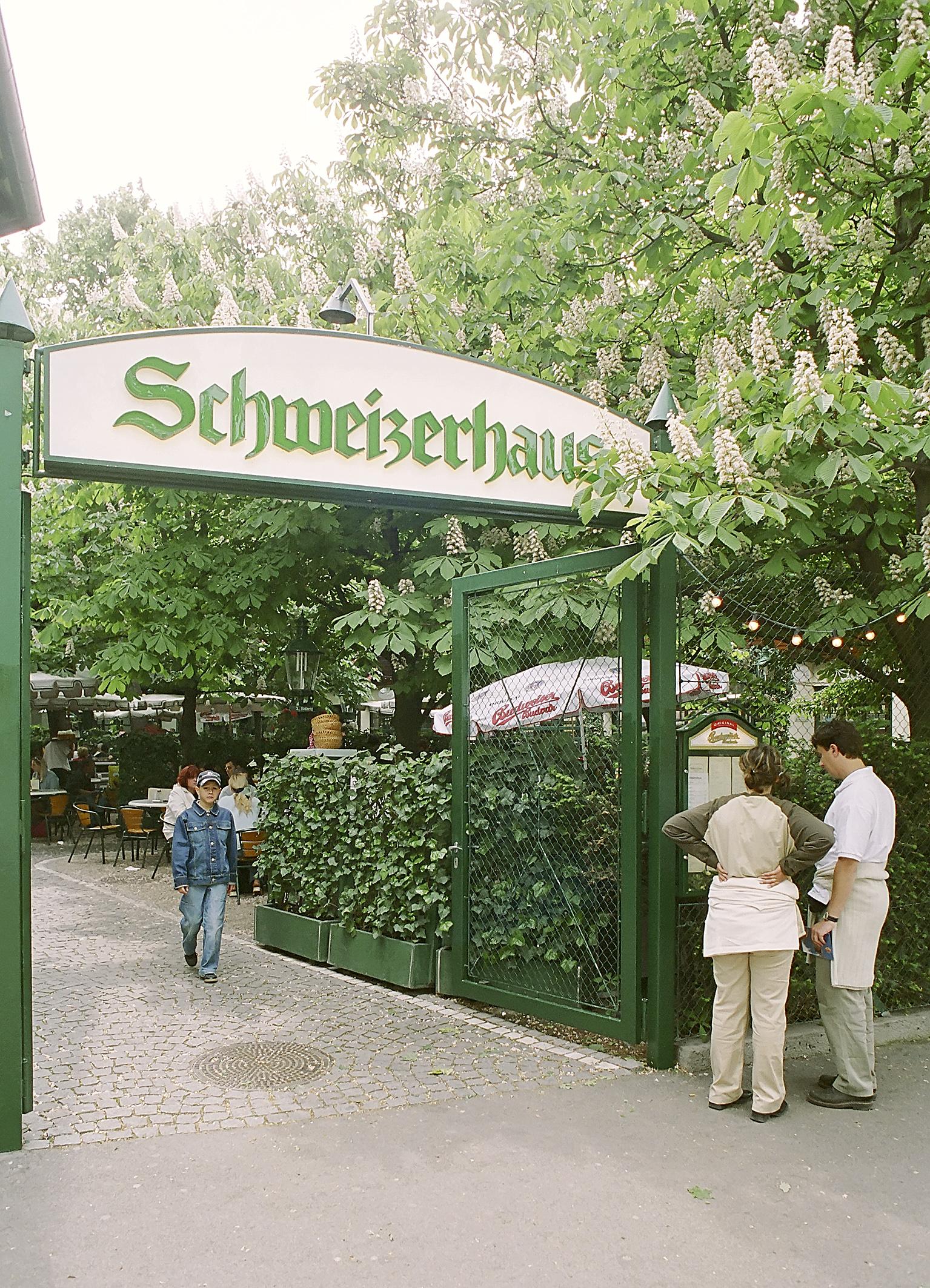|
Café Hawelka
Café Hawelka () is a traditional Viennese café located at Dorotheergasse 6 in the Innere Stadt, the first district of Vienna, Austria. History The Café Hawelka was opened by Leopold Hawelka in 1939. Hawelka had previously operated the Kaffee Alt Wien on Bäckerstraße since 1936 and together with his wife Josefine took over the Café Ludwig in the Dorotheergasse in May 1939. This spot was originally the location of the "Chatham Bar" opened in 1906. For two decades in recent past it was wrongly believed that the original venue was called "Je t'aime-Bar". After the outbreak of World War II, the Hawelka had to be closed, and in Fall 1945 it was reopened in the still largely intact building. After the end of the period of occupation after 1955, the café quickly became a meeting point for writers and critics like Heimito von Doderer, Albert Paris Gütersloh, Hilde Spiel, Friedrich Torberg and Hans Weigel. After the closing of the Café Herrenhof in 1961, even more artists gath ... [...More Info...] [...Related Items...] OR: [Wikipedia] [Google] [Baidu] |
Ernst Fuchs (painter)
Ernst Fuchs (13 February 19309 November 2015) was an Austrian painter, draftsman, printmaker, sculptor, architect, stage designer, composer, poet, and one of the founders of the Vienna School of Fantastic Realism. In 1972, he acquired the derelict Otto Wagner Villa in Hütteldorf, which he restored and transformed. The villa was inaugurated as the Ernst Fuchs Museum in 1988. Education Born in Vienna as the only child of Maximilian and Leopoldine Fuchs, Fuchs attended the St. Anna Painting School, where he studied under Fritz Fröhlich (1944). He entered the Academy of Fine Arts Vienna (1945), where he began his studies under Professor , later moving to the class of Albert Paris von Gütersloh. Career At the Academy, he met Arik Brauer, Rudolf Hausner, Helmut Leherb, Fritz Janschka, Wolfgang Hutter, and Anton Lehmden, together with whom he later founded what has become known as the Vienna School of Fantastic Realism The Vienna School of Fantastic Realism (german: Wiener Sch ... [...More Info...] [...Related Items...] OR: [Wikipedia] [Google] [Baidu] |
Andrea Eckert
Andrea Eckert (born 17 September 1958) is an Austrian stage and film actress, singer and documentary filmmaker. Born in Vienna, Eckert first studied literature in Paris, France, then decided on a stage career and trained with Dorothea Neff. Her roles have included the eponymous heroines in Hebbel's ''Judith (Hebbel), Judith'', Schiller's ''Maria Stuart (play), Maria Stuart'', Elfriede Jelinek, Jelinek's ''Clara Schumann, Clara S.'', Sophocles's ''Electra (Sophocles), Elektra'', Heinrich von Kleist, Kleist's ''Penthesilea'', and Maria Callas in Terrence McNally's ''Meisterklasse'' (''Master Class (1995 play), Master Class''). Eckert has frequently appeared on television (for example in guest roles on ''Kommissar Rex'') and in the cinema. She also made documentary film, documentaries about Lucia Westerguard, Turhan Bey, and Café Hawelka, Leopold and Josefine Hawelka. She lives in Vienna. Filmography (excerpt) * ''Kinder der Landstrasse (film), Kinder der Landstrasse'' (1992) * ... [...More Info...] [...Related Items...] OR: [Wikipedia] [Google] [Baidu] |
Documentary Film
A documentary film or documentary is a non-fictional film, motion-picture intended to "document reality, primarily for the purposes of instruction, education or maintaining a Recorded history, historical record". Bill Nichols (film critic), Bill Nichols has characterized the documentary in terms of "a filmmaking practice, a cinematic tradition, and mode of audience reception [that remains] a practice without clear boundaries". Early documentary films, originally called "actuality films", lasted one minute or less. Over time, documentaries have evolved to become longer in length, and to include more categories. Some examples are Educational film, educational, observational and docufiction. Documentaries are very Informational listening, informative, and are often used within schools as a resource to teach various principles. Documentary filmmakers have a responsibility to be truthful to their vision of the world without intentionally misrepresenting a topic. Social media platfor ... [...More Info...] [...Related Items...] OR: [Wikipedia] [Google] [Baidu] |
List Of Restaurants In Vienna
This is a list of notable restaurants in Vienna, Austria. Restaurants in Vienna * Altmann & Kühne – confiserie and chocolaterie in Vienna established in 1928 * Demel – famous pastry shop and chocolaterie established in 1786 in Vienna * Donauturm – prominent tower in Vienna with two revolving restaurants * Griechenbeisl – oldest restaurant in Vienna, founded in 1447 * Palais Esterházy – baroque palace in Vienna that houses a famous and popular restaurant in the former wine cellars, called ''Esterházykeller'' * Schweizerhaus – has a huge beer garden which is subdivided into smaller areas, each of which is named accordingly to a town district of Vienna Cafés The Viennese coffee house is a typical institution of Vienna that played an important part in shaping Viennese culture. * * * * * * * * * * * * * See also * Lists of restaurants * Schanigarten – Austro-Bavarian term for tables and chairs set up on the sidewalk in front of eating ... [...More Info...] [...Related Items...] OR: [Wikipedia] [Google] [Baidu] |
Cappuccino
A cappuccino (; ; Italian plural: ''cappuccini'') is an espresso-based coffee drink that originated in Austria and was later popularized in Italy and is prepared with steamed milk foam (microfoam). Variations of the drink involve the use of cream instead of milk, using non-dairy milk substitutes and flavoring with cinnamon or chocolate powder. It is typically smaller in volume than a caffè latte, with a thicker layer of microfoam. The name comes from the Capuchin friars, referring to the colour of their habits, and in this context referring to the colour of the beverage when milk is added in small portion to dark, brewed coffee (today mostly espresso). The physical appearance of a modern cappuccino with espresso créma and steamed milk is a result of a long evolution of the drink. The Viennese bestowed the name "Kapuziner", possibly in the 18th century, on a version that included whipped cream and spices of unknown origin. The Italian cappuccino was unknown outside Italy unti ... [...More Info...] [...Related Items...] OR: [Wikipedia] [Google] [Baidu] |
Buchteln
Buchteln (from Czech , pl. , also in German: pl., sing. ; also , , ), are sweet rolls made of enriched yeast dough, filled with powidl, jam, chocolate, ground poppy seeds or quark, brushed with butter and baked in a large pan so that they stick together and can be pulled apart. The traditional buchtel is filled with powidl. Buchteln may be topped with vanilla sauce, powdered sugar or eaten plain and warm. Buchteln are served lukewarm, mostly as a breakfast pastry or with tea. In the 19th century they could be boiled similar to dumplings. The origin of the buchteln is the region of Bohemia, but they also play a major part in the Austrian, Slovak, Slovenian, and Hungarian cuisine. In Bavaria buchteln are called ''Rohrnudeln'', in Slovenian ''buhteljni'', in Serbian ''buhtle'' or ''buhtla'', in Hungarian ''bukta'', in Kajkavian ''buhtli'', in Croatian ''buhtle'', in Polish ''buchta'', and in Czech ''buchta'' or ''buchtička'', in Lombard ''Buten''. In Romania, in the Banat r ... [...More Info...] [...Related Items...] OR: [Wikipedia] [Google] [Baidu] |
Georg Danzer
Georg Franz Danzer (7 October 1946, in Vienna – 21 June 2007, in Asperhofen, Lower Austria) was an Austrian singer-songwriter. Although he is credited as one of the pioneers of Austropop (most famous are his comic songs "Jö schau" (about a streaking, streaker at the Café Hawelka) and "Hupf' in Gatsch", both in Viennese German), he always refused to be part of this genre. Danzer was successful as a solo artist, but also in the group Austria3, along with Wolfgang Ambros and Rainhard Fendrich. Besides his music, he translated two books from Spanish into German, and was strongly involved in highlighting social inequalities, opposing racism and any form of societal discrimination, and the lifestyle of the bourgeoisie for all his life. Danzer was romantic, funny, socially engaged – and often a misfit. Having been a strong smoker for decades, he abstained from smoking after being diagnosed with lung cancer, but nevertheless died from the disease. His legacy includes some 400 songs. ... [...More Info...] [...Related Items...] OR: [Wikipedia] [Google] [Baidu] |
Oskar Werner
Oskar Werner (; born Oskar Josef Bschließmayer; 13 November 1922 23 October 1984) was an Austrian stage and cinema actor whose prominent roles include two 1965 films, '' The Spy Who Came in from the Cold'' and ''Ship of Fools''. Other notable films include ''Decision Before Dawn'' (1951), ''Jules and Jim'' (1962), ''Fahrenheit 451'' (1966), ''The Shoes of the Fisherman'' (1968) and ''Voyage of the Damned'' (1976). Werner accepted both stage and film roles throughout his career. He won a Golden Globe for Best Supporting Actor, and had been nominated several times for the Golden Globe, the Academy Award as well as the BAFTA Award. Early life Born in Vienna, Werner spent much of his childhood in the care of his grandmother, who entertained him with stories about the Burgtheater, the Austrian state theatre, where he was accepted at the age of 18 by Lothar Müthel. He was the youngest person to receive this recognition. He made his theatre debut using the stage name Oskar Werner i ... [...More Info...] [...Related Items...] OR: [Wikipedia] [Google] [Baidu] |
Gerhard Rühm
Gerhard Rühm (born 12 February 1930 in Vienna) is an Austrian author, composer and visual artist. Biography Rühm studied the piano and music composition at the University of Music and Performing Arts in Vienna. Following his studies he undertook private lessons with the twelve-tone composer Josef Matthias Hauer. Since the beginning of the 1950s Rühm has produced sound poetry, spoken word, visual poetry, photomontages and books. He is a co-founder of the Wiener Gruppe (Vienna Group), with Friedrich Achleitner, Hans Carl Artmann, Konrad Bayer und Oswald Wiener, as well as the publisher of an anthology by the same name. From 1972–1996 Rühm taught as a professor at the University of Fine Arts, Hamburg and from 1978–1982 he acted as president of the Grazer Autorenversammlung. His artistic production is inspired by August Stramm, Kurt Schwitters, Gertrude Stein, Carl Einstein und Paul Scheerbart. Rühm's works are often located at the border between music, language, gestur ... [...More Info...] [...Related Items...] OR: [Wikipedia] [Google] [Baidu] |
Helmut Qualtinger
Helmut Qualtinger (; 8 October 1928 – 29 September 1986; alt. sp.: ''Helmuth Qualtinger''; birthname: ''Helmut Gustav Friedrich Qualtinger'') was an actor, writer, reciter and cabaret performer. Biography He was born Helmut Gustav Friedrich Qualtinger in Vienna, First Austrian Republic to a secondary education teacher and his wife, stemming from the bourgeoise class of the Bildungsbürgertum, his father being a follower of the German Nazi movement. While at school Qualtinger's interest in literature and acting became obvious and he founded a youth theater as a pupil. Afterwards he initially studied medicine and literature, but quit university to become a newspaper reporter and film critic for local press, while beginning to write his own texts for cabaret performances and theater plays. Qualtinger continued as an actor at student theaters and revues and attended the Max Reinhardt Seminar as a guest student. Cabaret Beginning in 1947, he appeared in cabaret performances. In 194 ... [...More Info...] [...Related Items...] OR: [Wikipedia] [Google] [Baidu] |







